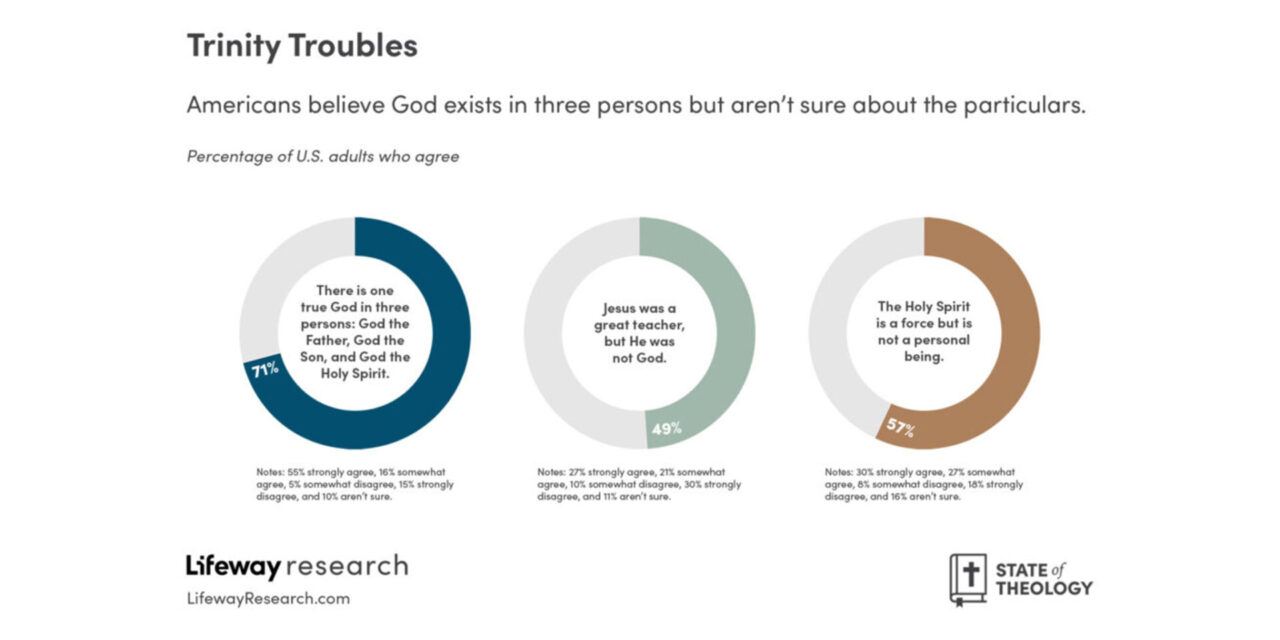This article was originally written by Aaron Earls and published to
BRENTWOOD, Tenn. — U.S. adults don’t think God changes. Their beliefs about the divine have basically stayed the same, as well.
The latest State of Theology study from Lifeway Research and Ligonier Ministries finds significant stability across a wide range of theological beliefs.
Societal changes following the COVID-19 pandemic led to several theological shifts in the 2022 State of Theology, but many reverted to previous pre-pandemic norms in 2025.
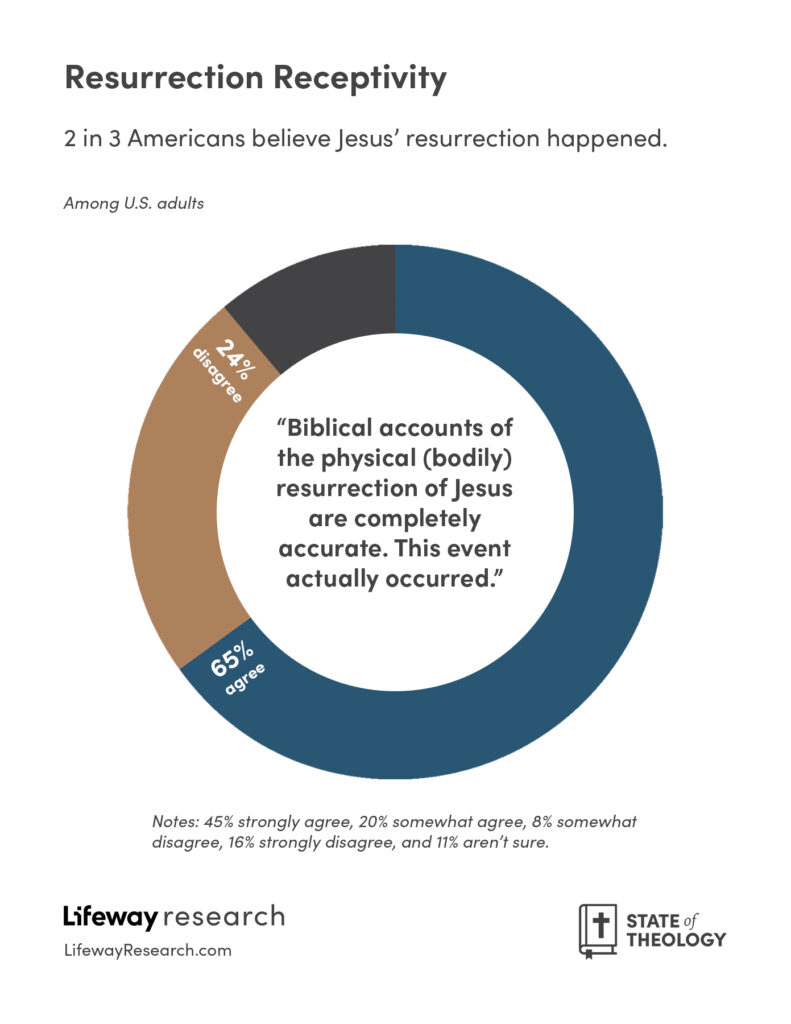 “While many aspects of American society can accurately be described as secular, large numbers of Americans have theological beliefs that line up with the Bible’s teaching,” said Scott McConnell, executive director of Lifeway Research. “A pandemic and debates around moral standards in political spaces appear to have some minor impact on some beliefs, but most Americans are not quick to change their views of matters related to God.”
“While many aspects of American society can accurately be described as secular, large numbers of Americans have theological beliefs that line up with the Bible’s teaching,” said Scott McConnell, executive director of Lifeway Research. “A pandemic and debates around moral standards in political spaces appear to have some minor impact on some beliefs, but most Americans are not quick to change their views of matters related to God.”
The State of Theology tracks Americans’ beliefs about God’s nature, sin, the Bible and more. The 2025 version surveyed more than 3,000 U.S. adults and follows previous studies in 2014, 2016, 2018, 2020 and 2022.
Divine discussions
More than 2 in 3 Americans (68 percent) say God is unchanging, but they aren’t always consistent in their theological perspectives.
Seven in 10 (71 percent) agree there is one true God in three Persons: God the Father, God the Son and God the Holy Spirit. However, many Americans struggle with the logical conclusions of that belief. Most (57 percent) say the Holy Spirit is a force, not a personal being. A quarter (26 percent) disagree. Evangelicals by religious tradition (38 percent) and evangelicals by belief (41 percent) are among those most likely to disagree.
While the percentage who believe Jesus was a great teacher but not God has dropped slightly from the 53 percent who said so in 2022, half (49 percent) still agree that is the case, while 40 percent disagree. Again, evangelicals by religious tradition (62 percent) and evangelicals by belief (68 percent) are more likely than most to disagree.
U.S. adults may feel complicated or even contradictory beliefs about God are OK because many don’t see religion as an area of clear right and wrong. Around 2 in 3 (65 percent) say God accepts the worship of all religions, including Christianity, Judaism and Islam. Almost half (46 percent) agree religious belief is not about objective truth, while a third (32 percent) disagree.
“When a clear majority of Americans think God is flexible when it comes to religion, it’s not surprising that agreement with some teachings in the Bible does not translate to accepting all biblical teaching. Americans want the same flexibility they think God has, even if that contradicts other beliefs they have and how God is revealed in Scripture,” said McConnell.
Additionally, more than 4 in 5 Americans (83 percent) say God loves all people the same way, and 66 percent believe God is a perfect being and cannot make a mistake.
Theology in practice
One of the few areas of change in the State of Theology surrounds joining and attending a local church. In 2022, following the pandemic, 66 percent of Americans said worshiping alone or with one’s family is a valid replacement for regularly attending church. The two-thirds who agreed marked a significant increase from 58 percent in 2020. This year, the percentage has dropped but remains above pre-pandemic levels.
In 2025, 63 percent of U.S. adults say their personal or family worship is a good church attendance substitute, while 26 percent disagree. Self-identified Christians, mainline Protestants (71 percent) and Catholics (67 percent) are more likely than Black Protestants (57 percent) and evangelical Protestants (52 percent) to agree.
Americans who are regular churchgoers, attending at least once or twice a month, are far more likely to disagree than those who don’t attend church services as often (42 percent v. 15 percent). Evangelicals by belief are also more likely to disagree than U.S. adults without such beliefs (49 percent v. 21 percent).
Not only do most Americans say personal or family worship is a valid replacement for church attendance, but most also don’t believe Christians must become church members. Only a third of U.S. adults (33 percent) say every Christian has an obligation to join a local church, down slightly from 36 percent who agreed in 2022. Three in 5 (59 percent) disagree, including 37 percent who strongly disagree.
Regular churchgoers are more likely than those who attend less frequently to say Christians have that obligation (57 percent v. 15 percent). A 2024 Lifeway Research study found 82 percent of those who attend church at least once a month are also members of that congregation.
Mainline Protestants (62 percent) and Catholics (54 percent) are more likely than evangelical Protestants (45 percent) and Black Protestants (35 percent) to disagree that every Christian has the obligation to join a local church.
“While the focus of this study is on Americans’ beliefs, an important part of those beliefs is what people think it means to practice a faith in God,” McConnell said. “There are many people inside the church and even more outside who think believing without attending in person or belonging is OK.”
While Americans don’t care if the beliefs of Christians lead them to attend church or not, they don’t want those beliefs to enter the political realm. Most (54 percent) say Christians should not allow their religious beliefs to influence their political decisions, while 39 percent disagree. Catholics are among those most likely to agree (62 percent), while evangelicals by belief are among those most likely to disagree (65 percent).
Sin and society
Americans feel good about their own goodness and innocence. Two in 3 (66 percent) believe everyone sins a little, but most people are good by nature. Also, 3 in 4 (74 percent) agree that everyone is born innocent in the eyes of God.
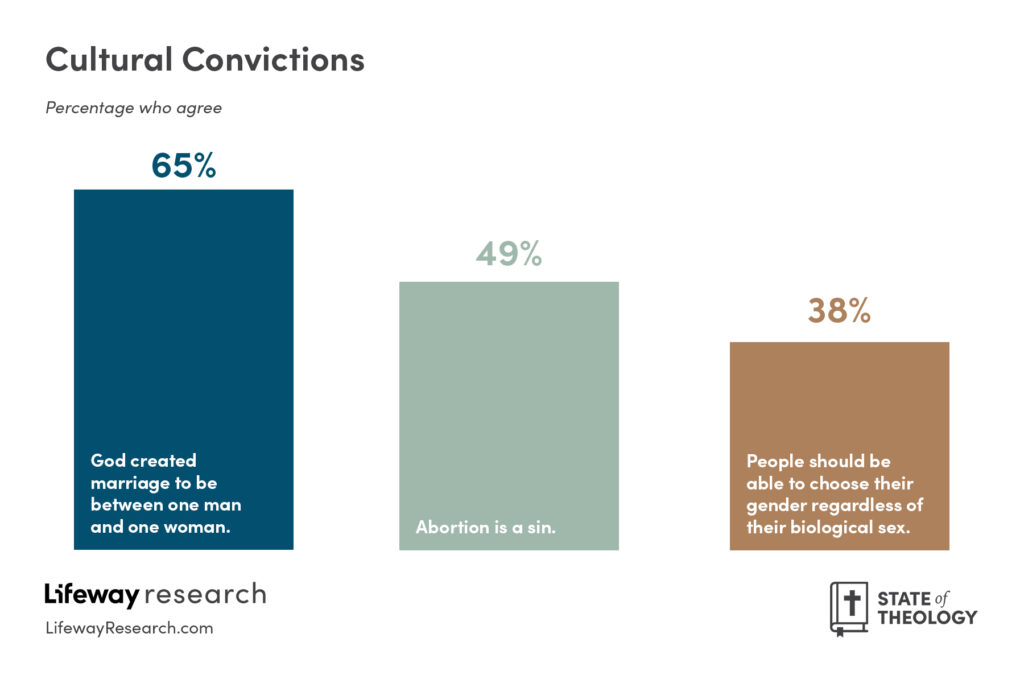 “It’s easier to say you are naturally good, when you shorten the list of what is a sin,” McConnell said. “Americans are quick to say they were born innocent, but they are split on the sinfulness of many things the Bible condemns.”
“It’s easier to say you are naturally good, when you shorten the list of what is a sin,” McConnell said. “Americans are quick to say they were born innocent, but they are split on the sinfulness of many things the Bible condemns.”
Half of U.S. adults (52 percent) say sex outside of traditional marriage is a sin. Even more (65 percent) believe God created marriage to be between one man and one woman.
Almost 9 in 10 evangelical Protestants (89 percent) and Black Protestants (87 percent) agree that is the divine design of marriage, compared to 72 percent of mainline Protestants and 71 percent of Catholics. Almost all evangelicals by belief (98 percent) believe God created marriage to be that way.
On social issues, half of Americans (49 percent) believe abortion is a sin, down from 53 percent in 2022.
Fewer than 2 in 5 (38 percent) say people should be able to choose their gender identity regardless of their biological sex. Most (54 percent) disagree, including 42 percent who strongly disagree.
U.S. adults younger than 35 (54 percent), those living in the West (50 percent) and those in large cities (46 percent) are among those most likely to agree that gender identity can be chosen.
Catholics (38 percent) are the Christian group most likely to agree. Regular churchgoers (68 percent) and evangelicals by belief (82 percent) are among the most likely to disagree that people should be able to choose their gender identity.
Eternal perspectives
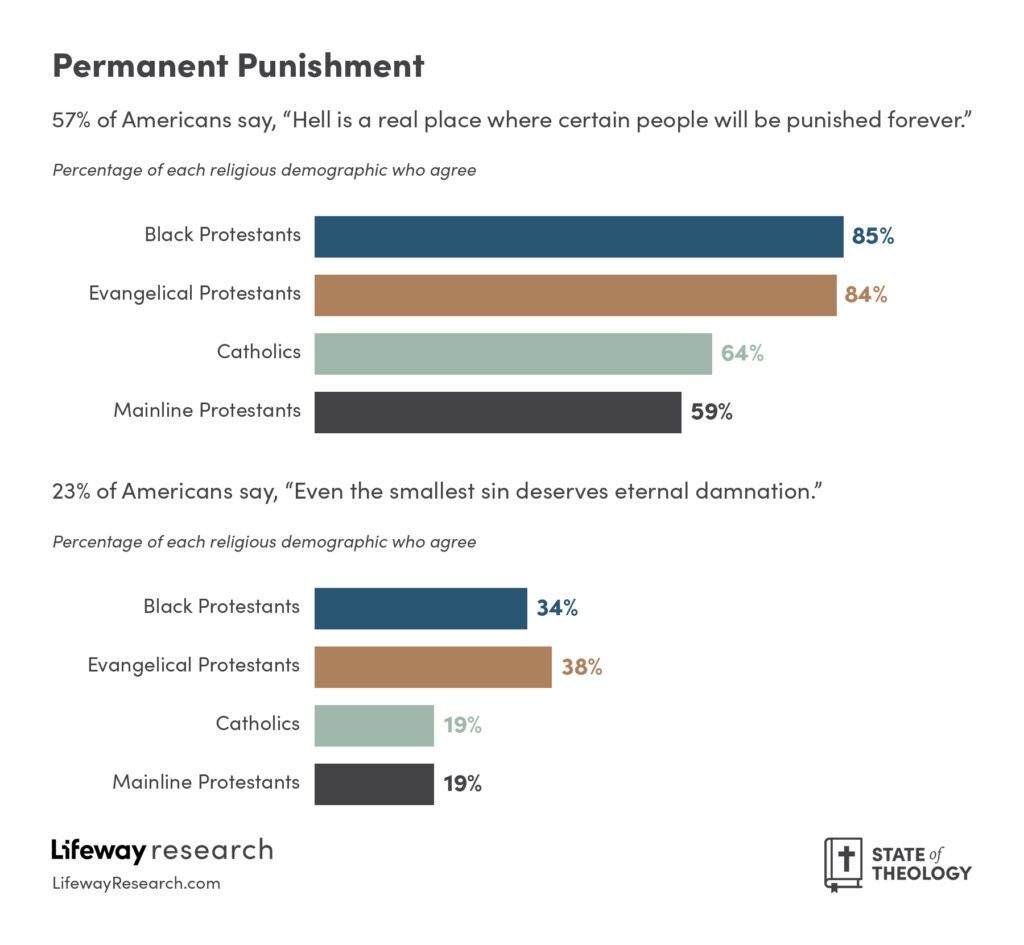
Most Americans have no issues with the existence of hell and the return of Jesus to judge, but they might assume those don’t apply to most people.
More than 3 in 5 Americans (62 percent) believe there will be a time when Jesus Christ returns to judge all the people who have lived.
Almost 3 in 5 U.S. adults (57 percent) say hell is a real place where certain people will be punished forever. Black Protestants (85 percent) and evangelical Protestants (84 percent) are more likely than Catholics (64 percent) and mainline Protestants (59 percent) to agree.
However, less than a quarter (23 percent) agree that even the smallest sin deserves eternal damnation, while 71 percent disagree, including 60 percent who disagree strongly. That belief is not broadly popular among Christians, as a minority of evangelical Protestants (38 percent), Black Protestants (34 percent), mainline Protestants (19 percent) and Catholics (19 percent) agree.
“Americans are much more willing to agree Jesus will judge people one day than to agree on what is a sin or which sins deserve eternal punishment,” said McConnell.
Biblical authority
Americans’ perspectives on the Bible are divided. Around half (49 percent) believe the Bible is 100 percent accurate in all that it teaches. Similarly, however, 48 percent say the Bible, like all sacred writings, contains helpful accounts of ancient myths but is not literally true. That percentage declined from the 53 percent who agreed in 2022.
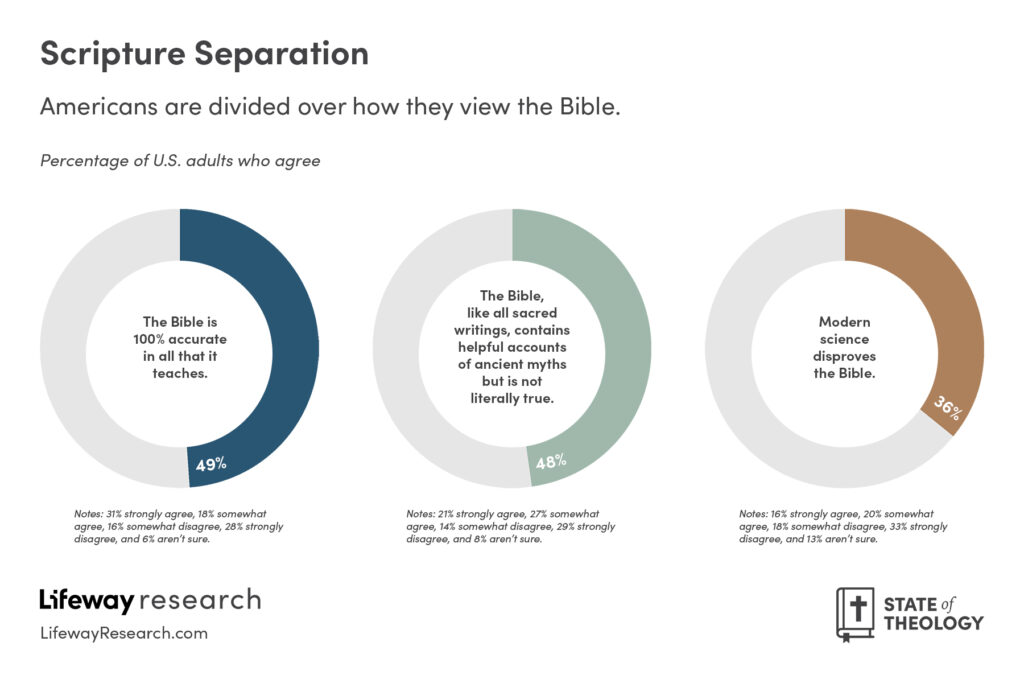
Today, more than a third (36 percent) believe modern science disproves the Bible, down from 40 percent in the last State of Theology.
“More Americans believe the Bible is a myth than believe it has been proven to be false,” said McConnell. “While two-thirds of Americans believe key truths taught in the Bible, it is almost evenly split between those willing to trust and dismiss the entire message of the Bible.”
Half (50 percent) of Americans believe the Bible has the authority to tell us what we must do, while 44 percent disagree. Only 16 percent believe the Holy Spirit can tell them to do something forbidden in the Bible, down from 22 percent in 2022.
Two in 5 (41 percent) say the Bible’s condemnation of homosexual behavior doesn’t apply today, down from 46 percent in 2022. Today, 46 percent disagree.
Whatever else they may believe about God or the Bible, 2 in 3 Americans (65 percent) agree the biblical accounts of the physical or bodily resurrection of Jesus are completely accurate. They say this event actually occurred. Around a quarter (24 percent) disagree. Acceptance of Jesus’ resurrection has remained stable since 2016.
“The heart of Christianity is a belief in who Jesus Christ is and dependence on His death and resurrection to have fellowship with God,” said McConnell. “Not all who believe Jesus’ resurrection occurred have chosen to follow Him, but it is a fundamental piece of the Christian faith.”
For more information, view the complete report and the white paper. Also, visit TheStateOfTheology.com and LifewayResearch.com/StateOfTheology.
Methodology
A demographically balanced online panel was used for interviewing American adults, with 3,001 surveys completed Jan. 6 – Jan. 15, 2025. The sample provides 95 percent confidence that the sampling error from the online panel does not exceed plus or minus 1.9 percent. Margins of error are higher in sub-groups. Slight weights were used to balance gender, age, ethnicity, income, region and religion.
Evangelical Beliefsare defined using the National Association of Evangelicals and Lifeway Research evangelical beliefs research definition based on respondents’ beliefs. Respondents are asked their level of agreement with four separate statements using a four-point, forced-choice scale (strongly agree, somewhat agree, somewhat disagree, strongly disagree). Those who strongly agree with all four statements are categorized as having evangelical beliefs:
- The Bible is the highest authority for what I believe.
- It is very important for me personally to encourage non-Christians to trust Jesus Christ as their Savior.
- Jesus Christ’s death on the cross is the only sacrifice that could remove the penalty of my sin.
- Only those who trust in Jesus Christ alone as their Savior receive God’s free gift of eternal salvation.


